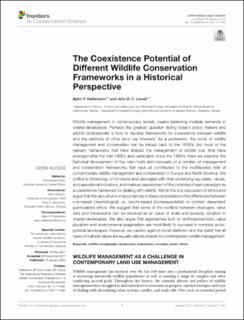The coexistence potential of different wildlife conservation paradigms in a historical perspective
Peer reviewed, Journal article
Published version

Åpne
Permanent lenke
https://hdl.handle.net/11250/3010349Utgivelsesdato
2022Metadata
Vis full innførselSamlinger
- Publikasjoner fra CRIStin - NINA [2364]
- Scientific publications [1392]
Originalversjon
10.3389/fcosc.2021.711480Sammendrag
Wildlife management in contemporary Europe means balancing multiple demands in shared landscapes. Perhaps the greatest question facing today’s policy makers and wildlife professionals is how to develop frameworks for co-existence between wildlife and the plethora of other land use interests. As a profession, the roots of wildlife management and conservation can be traced back to the 1600’s, but most of relevant paradigms that have shaped the management of wildlife over time have emerged after the mid-1800’s and particularly since the 1960’s. Here we examine the historical development of the main traits and concepts of a number of management and conservation paradigms that have all contributed to the multifaceted field of contemporary wildlife management and conservation. We outline a chronology of concepts and ideologies with their underlying key ideas, values and operational indicators and make an assessment of the potential of each paradigm as a coexistence framework for dealing with wildlife. We tie this to a discussion of ethics and argue that the lack of unity in approaches is deeply embedded in the disagreements between rule-based (deontological) versus results-based (consequentialist) ethics. We suggest that some of the conflicts between ideologies, value sets and paradigms can be resolved as an issue of scale and zonation in shared landscapes. We also argue that approaches built on anthropocentrism, value pluralism and environmental pragmatism are most likely to succeed in omplex socio-political landscapes. However, we caution against moral relativism and the belief that all types of cultural values are equally valid as a basis for contemporary management. Wildlife management, conservation, paradigms, concepts, Values, Ethics
